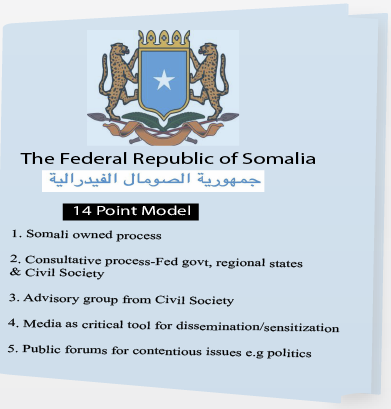Government and Civil Society set out a joint constitutional review formula

The government and the civil society have agreed on a working formula which would see the two develop a coherent and all inclusive constitutional review process.
In a two day constitutional stakeholders meeting hosted by the Ministry of Constitutional Affairs in Mogadishu, both parties agreed to front a joint strategy guided by national interests with the view to educating and sensitizing the public on the Provisional Constitution.
Key to the agreement is a 14 point proposal presented by the civil society which seeks among other things to ensure a fully Somali owned process through the review and public awareness campaigns.
The Prime Minister in his closing remarks stressed the importance of the consultative process for the completion of the Constitution. He pointed out that the Civil Society are the core part of this process to make the Provisional Constitution complete.
“Our country has suffered from a long period of political instability; today we are working on completing the final drafts to the Constitution in order to attain political stability governed by a strong and solid Constitution” the Prime Minister said.
The PM also advised the Civil society not to be influenced by anything else other than national interests and what is best for the country. Representatives from Regional States – Puntland, Galmudug, Jubbaland, South-West, and from Hiran and Middle Shabelle and Banadir and civil society attended the meeting.
The cabinet last month proposed a seven month constitutional review process which would end with a presentation of the outcome in a High Level Partnership Forum in January 2016.
The following is a list of the 14 points as presented by the civil society:
1. It was carefully underscored that all constitutional review and public awareness campaigns should be Somali led so that the outcome would be Somali owned.
2. Constitutional Ministry, parliamentary committee on the constitutional review, the Independent Constitutional Review Committee and the Civil Society should work together to educate and involve the public about the process of the review.
3. To facilitate the smooth running of the process and set workable framework, the civil society and the constitutional ministry should enter into memorandum of understanding (MoU)
4. To get qualified people who can run the process, adequate training on the matter should be given to people from different categories of the society, including women, youth, elders, religious scholars, disables, and politicians.
5. The constitution should be written in Somali language so that the public can understand to the fullest.
6. An Advisory Group should be named from the civil society who would advice the ministry continuously.
7. The constitutional institutions in the government should inform the civil society every media engagement about the review less to course unnecessary controversies and misunderstanding among the public.
8. The most difficult part of the review is that which concerns politics, so the ministry should hold town hall meetings to discuss this sensitive matters
9. The civil society should be considered the voice of the public and can talk on their behalf
10. To disseminate the information the media and social media should be used so that the public should know and understand about the constitution
11. When disseminating the messages, poetry and cultural means should be used in accordance with any given community.
12. The rights of people with special needs , visible or not visible disabilities, should be considered
13. The international organizations who are trying to held the government and the Somali people in this regard should coordinate their efforts and they should work with the constitutional organs of the government who are tasked for the constitutional review.
14. Regional states are very important stakeholders in this, and they should afforded with best opportunity to have their say in the process in the review.
Goobjoog News